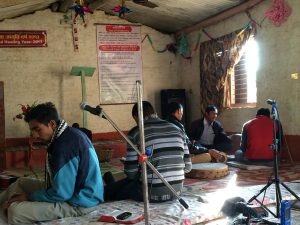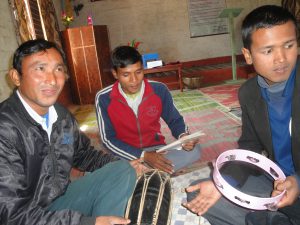After many days of travel and adjustments to schedules we finally began our first song development session at 9:40am! I introduced them to the whole concept of creating songs to teach Christ-centered leadership. These songs will repeat the stories from the curriculum. The songs will also recreate those “a-haa” moments that are so critical in the learning process.
Interact with the story

For the first song I began by reading Hebrews 13:7 to them.“Remember your leaders who spoke the words of God to you. Consider the outcome of their way of life and imitate their faith. Jesus Christ is the same yesterday, today and forever.”
After reading the scripture I asked each to tell of one person who was instrumental in forming them into Godly men today. Their answers identified mentors of various sorts; for Dhan and Balu this was their senior pastor while Ram named Mosa, a leader from his youth.
Next I had them share what characteristics were most significant in this process; they named: quiet wisdom, maturity, integrity between the leader’s teaching and his life, humility, a lack of anger and admirable gifts of teaching.
I asked if any of these men of influence were famous or had positions of power or were rich. “None,” they said – these were Godly, humble men. I pointed out that most young men seek after fame and position and riches thinking these are the reward or even the measure of a good leader. Instead, the most influential leaders in their lives had been those who spoke the Word of God to them and lived with humility and wisdom. If we desire true influence then it will happen by choosing a path of humily not pride.
Present the song guidelines
The guideline for this first song follows the outline of Hebrews 13:7
- Remember your leaders who spoke the word of God to you
- Not many were famous
- Not many were powerful
- Not many were rich
- Consider the outcome of their way of life
- Imitate their faith
- Jesus Christ is the same yesterday, today and forever. (note: the connection here is that the wisdom of this leadership never changes)
Compose the songs
That’s it for the structured interaction. At this point they broke into groups to compose their first song. The room was filled with hummed and softly sung phrases as they worked out the wording and tunes for each song. Some moved to another room or under a tree to be able to work without being distracted by the other musicians.

My experience has been that those who are closest to rural village culture are able to compose the fastest. I think there are two factors that enable some to compose so easily. First, is the very limited number of “stock” tunes for some cultural groups. I was recording with a group of Santali musicians last summer and they claimed that all Santali songs come from only twelve tunes. Of course each tune carries great significance in establishing general tone of the song – something to how we identify a love song ballad, a sad song in a minor key or an upbeat celebration – only for them there are not twelve categories of song but only twelve actual tunes! Second, is the absence of professional musician as a cultural category. In the villages there is no professional musician – only those who sing, dance or play instruments – and many can exchange roles with little difficulty – the musician role is not one of fame but one of service to the community. In these cultures the lack of a professional can also enable people to compose without the expectations and social stigmas that become prominent in other places.
Practice and refine the songs

Once the songs were composed the musicians gathered, this time with instruments to work out the arrangement of the song – who sings where, what instruments play and when and the basic rhythmic structures that create the desired groove. A key pastoral leader, usually my interpreter, sits in on this process to give direction for ideas could be problematic because they either don’t line up with Biblical teaching or because they just don’t “get it” in terms of leadership content. I remember once when the intent of the story was to expose the “big man” leadership style that demands respect on the basis of position, expects great privilege and tends to abuse authority. The young composer returned with a song that praised the glories of his leader to the point of worship; extolling the leaders’ virtues and exalting all that he does. So, in effect this musician was simply perpetuating a culturally prevalent model that was opposed to Christ-centered leadership. For this reason songs go through a refining process whereby the pastoral leadership gives input into specific phrases, implications or, as in this previous case, to requiring a complete rewrite.
Record the songs

As the musicians practiced I arranged both microphones and musicians so that they could perform effecively and so that I could accomplish a good recording as well. Sometimes this requires some creativity. For instance, if the lead singer is also playing an instrument, say a drum, or even worse, a tambourine, the sound from the instruments tend to overwhelm any microphone nearby – especially one set for vocal use. This can require building walls out of thin sleeping mattersses and peices of sheet wood or even a white board to isolate certain sounds from certain microphones. It can all look a little silly but those who hear the recording will never know!
Rewrite
Does it strike you as odd that I use terms such as “writing” “and “songwriting” when speaking of song creation for oral people? It is nearly impossible to escape the frameworks through which we process ideas –
and for those of us who enjoy reading, the conceptions of “reading” a culture, “writing” a song, or “printing” an idea on the hearts of people are hard to avoid. The other issue here is that most of these musicians are literate as well – but that doesn’t mean that they learn well through literate methods – just that they have the training to read and write (although for some this is only a primary grade level). The thing I like about working with these musicians is that they don’t generally operate in the same circles as senior leaders and tend to identify much more effectively with the needs of oral learners that are the focus of this project and who will comprise the vast majority of church leadership in their extensive organization. What about you? Do you learn best through classroom settings? Through hands-on experiences? Which do you remember – stories or lists?


